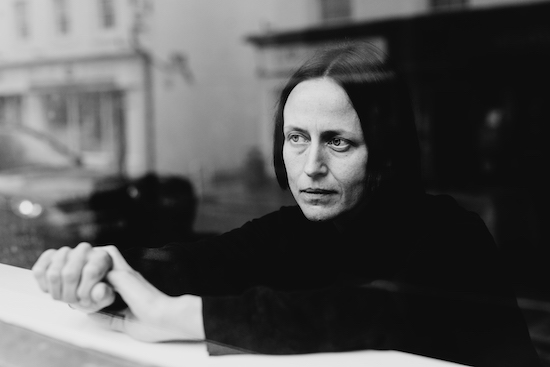Keeley Forsyth by Maria Alzamora
At first, Keeley Forsyth’s voice is the only thing you can hear. The title track ‘Debris’ immediately invites comparison to the timbral registers of Marianne Faithful and Nina Simone with the vibrato characteristic of Anohni. Forsyth’s voice is front and centre of her debut release, supported with grace and deference of a compact but terrifically expressive musical mise en scène played by Sam Hobbs, Mark Creswell and Matthew Bourne; making it a beautiful balanced and confident entry into the music world.
Forsyth might be new to this scene, but she’s been working as an actor for over twenty years, having starred in a number of acclaimed feature films and TV series, a fact which has impacted heavily on her music. ‘Black Bull’ hints at Forsyth’s natural instinct for musicality. Built on a spartan two-note phrase with a gentle piano and string accompaniment, this song is so quiet you can hear the strings being plucked but it’s the immediacy of the vocal melody and poetic lyricism that drives the song forward and outward to sublime poignancy.
Forsyth is able to create incredible depths with simple words and phrasing, combining them in a way that’s elusive and yet makes full emotional contact. By the third track ‘It’s Raining’, her dramatic proficiency begins to reveal itself more fully; the rolling of the ‘r’s, the wet ‘p’s and the transition between head and chest voice that refuses to be discreet.
Channelling the narrative confessional of Joni Mitchell’s ‘Both Sides Now’, Forsyth vacillates between breathy whispers and reedy resonances, somehow creating a fully developed song from only a handful of curious lyrics; a master of her own material. Just over midway through the eight-track album, ‘Lost’ announces itself as the emotional summit of this astounding debut. Rising and falling like an earthquake, ephemeral and intense, this hymnal declaration leaps into your imagination with lyrics that mingle the conceptual and concrete, resulting in a portrait of emotion that’s both grounded and yet out of reach: “Is this what madness feels like? / The smooth space after all boundaries have been dissolved / Where there is wind, high wind / But no tall trees for it to grapple with / No buckets for it to shove around the yard / Where tables are empty, where tables disappear / Where waiters have long since fallen into mountains / And mountains have collapsed into streams”. With a ghostly choir chanting in the background, and Bourne’s strings swelling with a exalted melancholy, Forsyth bridges the gap between performance poetry and song, inviting the listener to feel along with her, the exquisite pain of being alive.
While ‘Debris’ might be the selected single, it isn’t the best track on the album – perhaps because it feels as if Forysth is holding back and the quality of her powerful timbre is a bit distracting. The final track seems like a more natural choice. A stylistically accessible, stand-alone track, ‘Start Again’ is more conventionally structured and the only track on the record with a percussive beat, giving it a quietly compelling momentum.
It can be an awkward transition when an actor decides to take on musicianship. While a high profile might lend itself to an expedient release, it proves difficult to unhinge from the novelty factor to allow the music to be judged purely on its merit. Forsyth’s disciplinary leap however, is distinctively authentic and, ironically, it’s because of her dramatic experience. The Harrogate actor works with artists/filmmakers Iain and Jane Pollard to help her “visualise the performance on a larger scale”. The Pollards have worked with a wide range of British artists, performers and musicians including Nick Cave, Florence Pugh, Elena Tonra, George MacKay and many more in films, installations and exhibitions throughout the UK.
It’s not often a musician will cite choreographers as a direct influence on their music, but Forsyth has nominated German dancer Pina Bausch as a major inspiration and her work with British movement director Imogen Knight as a contributing force to her music and the associated performance. “I don’t look to make melodies or chorus and I don’t care if my music is unlistenable” says Forsyth, who maintains that she serves the purpose of the music only, “the body is the same. I move in a particular way when I perform and never for the sake of moving.”
The physicality and performative aspect can be heard throughout the album, through the choices Forsyth makes; breath and pacing and her distance to the microphone are all unique to a vocal style that announces itself confidently from the outset. Forsyth’s familiarity and confidence with the material can be heard through every inflection and recitation. This is a boldly honest and startling debut.



